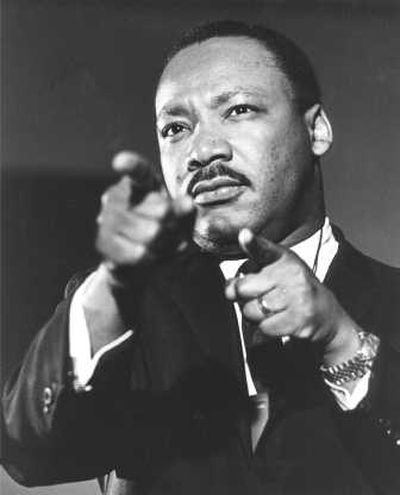A city marked by tragedy

It’s not always my first thought anymore. But it used to be. When I’d hear that some truly prominent public figure was coming to Spokane, I’d make a wish: Please don’t let this person get murdered while he/she is here.
I guess that was really more of a prayer.
It might sound odd or perhaps even callous. But, you see, I had moved here from Memphis, Tenn. And I knew a little bit about how the assassination of a towering personality can scar a city.
I didn’t live in Memphis when Martin Luther King Jr. was shot on this day in 1968. I was still a kid, growing up in the North.
But when I arrived in Tennessee in 1982, the smoke from that infamous rifle shot had yet to clear.
It wasn’t really a matter of what people said about the killing. Sometimes it was more like what they didn’t say.
Long experienced with complicated race relations that fluctuated from warm and relaxed to testy and polarized, most Memphians understood that some conversations were a walk through a mine field. Bringing up the assassination could, in certain settings, trigger the fuses.
It would be wrong to say there was a sense of collective guilt. Memphis had not killed the civil rights leader. No community penance could bring him back.
Still, the lingering stigma of having been the place where it happened was hard on a city already prone to defensiveness and self-doubt.
I used to believe the city’s obsession with acquiring professional sports franchises stemmed partly from a desire to subliminally supplant the nationwide association of “Memphis” with the damning datelines from that tragic evening 40 years ago.
I was a reporter and columnist there for six years, and the one time I actually got access to FedEx Chairman Fred Smith was to discuss plans to lure an NFL team to Memphis. In the end, the city had to settle for an NBA team.
The site of King’s death is now preserved and incorporated in a civil rights museum. I’ve been back to see it and was impressed.
When I lived there, though, the forlorn Lorraine Motel existed in a limbo state. It wasn’t really open for business. But if you gave the guy in the office a few bucks, you could get the key to King’s room.
I did this once. I was alone.
Visiting the drab room itself was depressing. It was cough-and-choke dusty and full of long-dead floral arrangements.
But outside, on the no-frills balcony, you could stand right where King fell. There were no signs or anything. I just knew from the news photos seen so many times.
It’s sort of interesting what can happen when you are trying too hard to be respectful. You get self-conscious and unwittingly block out your ability to meet the moment in real time; that’s what happened to me.
In the years since, though, I’ve thought countless times about standing in that spot. The memory is humbling and somewhat surreal.
For a long time, I thought of Memphis as being stuck standing in that same spot. But I hear that the humid city overlooking the big river is moving forward.
I hope that’s true.
One of the most important Americans of the 20th century tried to teach us a lesson about exactly that.
He said it’s a mistake to allow ourselves to get mired in the past.